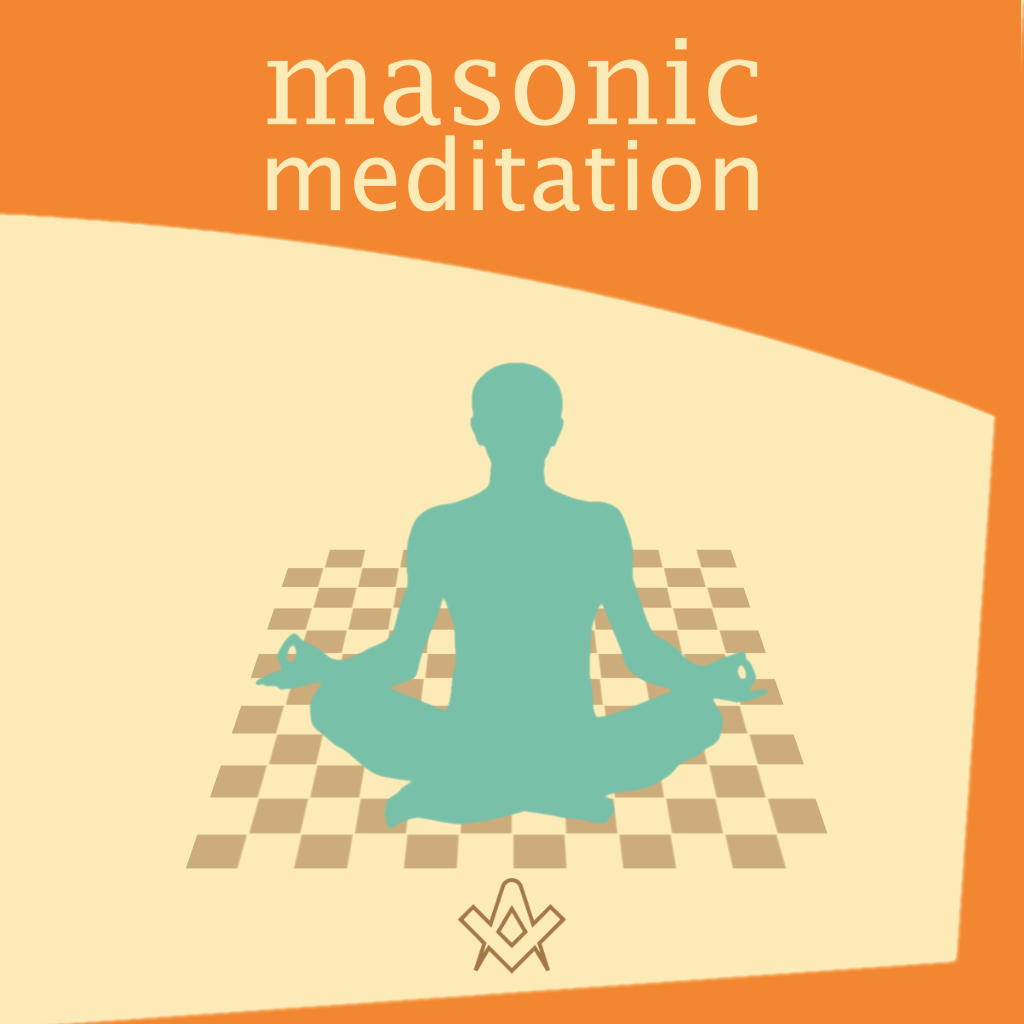All men’s miseries derive from not being able to sit in a quiet room alone.
Blaise Pascal
In a world where we are constantly being bombarded with information, it is becoming increasingly difficult not only to find a quiet place in our lives but also in our own heads.
And can we rely on the reliability of the information we receive in never-ending streams? Not only from mainstream media but that other torrent of ideas, opinions and ‘fake news’ i.e. Social media.
Today, it is more important than ever to utilise the knowledge, lessons, and wisdom that can be found within Freemasonry.
To contemplate, understand and digest the allegory and symbolism, so that we may then implement this in our daily lives.
The practise of Masonic meditation is not new but has perhaps been viewed as being used by those with more ‘esoteric‘ leanings.
However, now that meditation, in general, has seen a more populist renaissance backed up by medical and clinical studies that underline the cognitive and stress-busting benefits, it makes sense that the twain should now meet.
Sitting quietly, contemplating symbolism or ritual could be this year’s new tool to aiding memorisation of your ritual, the symbolism, or just finding space to think about how you can use what you have learnt within the degrees within your daily life.
Meditation doesn’t have to fit the image of the bearded sage, cross-legged and attempting to reach ‘Nirvana’ – it can encompass many different ways of utilising both a calming state and a way of contemplating a particular subject.
It can be as diverse as walking in nature, deeply in thought and reflection; or similar to prayer, where the focus is to connect on a higher level.
Personally, I prefer the use of the term ‘contemplation’, meaning:
- the action of looking thoughtfully at something for a long time;
- deep reflective thought, or –
- the state of being considered or planned.
Contemplation, or reflection, are often used as a way to focus on a subject that needs deeper understanding – those kind of sessions where we can achieve those ‘Eureka!’, or perhaps less dramatic ‘a-ha!’ moments.
In some Masonic Rites (most notably the Ancient and Accepted Scottish Rite, and French Rite), the Chamber of Reflection is used – a room where the Candidate for Initiation is required to:
![]()
meditate and consider how Freemasonry is about to change his life.
He is given a series of questions to answer.
Typically, he is asked his duties to God, his fellow men, and himself.
In some lodges he is also asked to make a will.
At the end of this time, he is led to the Temple for initiation
– Source: Wikimedia
So, how do you meditate – or contemplate?
There is no ‘right’ or ‘wrong’ way to do this – you don’t need to contort your legs into the blood-flow-restricting lotus position of the yogis, merely find a comfortable chair that allows you to sit in an upright position with feet placed on the floor.
Lying down is an option but you may find you fall asleep! Or, go for a walk in a quiet area, allowing your thoughts to flow from the subject you wish to contemplate.
If you like being told what to do and find guided meditation or visualisation preferable – see this video from Three Distinct Knocks – a website for Masonic education in audio, video, and written formats.
Here Bro. Chuck Dunning leads you through a guided meditation.
Episode 6.1 – Guided Meditation w/ Bro. Chuck Dunning – Youtube Audio only
♦ No requirement for ‘hippy-style’ stuff like incense, singing bowls, expensive meditation mats/cushions etc (unless of course you want to!)
♦ Breathe normally from the belly (not from the chest) – close your eyes if you wish, or otherwise look, in an unfocused way, at something benign – a candle flame, a log fire, the garden or vista from your window. If outside, sit somewhere quiet, beside a stream, on a hill, next to a tree – the list is endless.
♦ The main thing is to be in a quiet, undisturbed and comfortable place – which means turn off/mute the phone/computer/dog/children etc.
♦ Allow your thoughts to flow like a stream taking all the flotsam and jetsam gently along, you will find that you will then reach a state of calm, able to view things from a different perspective. Do not worry if your ‘stream’ resembles a tsunami of junk, it may be like this for days – or weeks – think of it as your brain ‘de-fragging’ and just let it go. Gradually, your mind will stop jumping around like a monkey on Red Bull and will allow you some clarity!
♦ How long should you meditate/contemplate? To start with – do what you can. Most forms of exercise, be they mental or physical need time to build up to a level where you feel comfortable – just do what you can and the main lesson to learn from this is – it’s not a competition, so don’t beat yourself up if you can’t immediately do what some ‘guru’ on YouTube is doing!
♦ The main thing is to find your own way – and to enjoy it. If you don’t enjoy it, don’t do it – there are other ways to learn from the wonderful teachings of Freemasonry.
Some of the most useful books for meditation on Masonic ritual and symbolism are those by Jonti Marks – author, teacher, and Freemason.
This is what Jonti says on his website:
For me – and I know it’s not a view shared by every Mason – Freemasonry is a spiritual discipline and its teachings reveal fundamental truths about our individual humanity, our relationships with each other and our fellow creatures and our relationship with God – whatever we conceive Him (Her? It?) to be.
These four books – the first two of which address the two basic orders of Freemasonry – using quotations from Masonic ritual and writings, as well as non-Masonic material, explore the possibilities and implications of Masonic thought and ideas.
The third and fourth books follow the same pattern but uses the Psalms as their inspiration and starting point.
I believe that they have something important to offer to Masons, to the family and friends of Masons and to the world at large.
Source: jontimarks.com

Jonti Marks has written five handbooks on Meditations for Freemasons

Level Steps: 100 Daily Meditations for Freemasons
By Jonti Marks
‘Level Steps:100 Daily Meditations for Freemasons’ is a beautiful and practical book offering insight and inspiration to all Freemasons who are interested in the deeper meaning of the Craft and who wish to make ‘…a daily advancement in Masonic knowledge.’
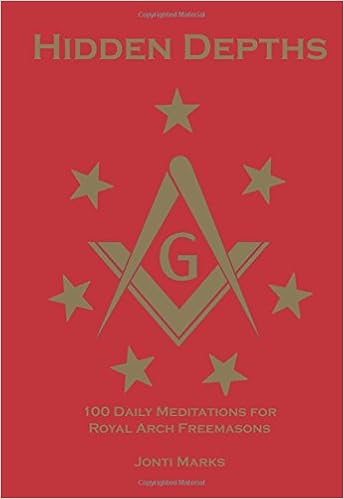
Hidden Depths: 100 Meditations for Royal Arch Freemasons
By Jonti Marks
Following on from the success of ‘Level Steps: 100 Daily Meditations for Freemasons,’ this companion volume offers further practical insights into the deeper spiritual meanings of Freemasonry, with particular reference to the symbolism and forms of the Holy Royal Arch.

Still Waters: Masonic Meditations on the Book of Psalms Vol I
By Jonti Marks
In this new volume of Masonic Meditations, the author of ‘Level Steps’ and ‘Hidden Depths’ sets out to reacquaint us with the beauty of the Psalms – both their innate poetry and the richness and humanity of their teachings.
The accompanying meditations serve as inspirations for further contemplation and study.
With their underlying message of love of God and strength in adversity, these meditations are offered in the hope that they will deepen our love and understanding of Freemasonry and of life itself.
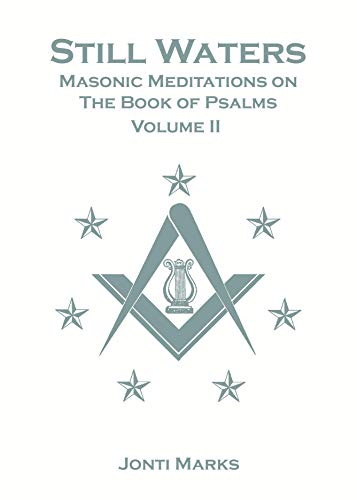
Still Waters: Masonic Meditations on The Book of Psalms Vol II
By Jonti Marks
This second volume of Masonic Meditations inspired by the Book of Psalms continues where the first one left off, thus completing the cycle which offers inspiring thoughts on all 150 Psalms in a series of 165 ‘meditations.’

365 Level Steps: Masonic Meditations for Every Day of the Year
By Jonti Marks
This newest volume from the author of ‘Level Steps’ and ‘Hidden Depths’ is a lightly edited compilation of all four previous books of ‘Masonic Meditations.’
Here, for the first time, all 365 inspirational quotations and meditations are presented together in a form that encourages us to consider deeply what it means to be a Freemason and to contemplate the true and timeless teachings of our beloved Craft.
This is a unique opportunity to make a genuine daily advancement in Masonic knowledge and to develop a real, heartfelt understanding of Masonic principles.

Secrets of Meditation: Simple Techniques for Achieving Harmony (Gateways to Health)
by Phillipa Faulks
The practice of meditation is an integral part of almost all world religions and its beneficial effects on the mind and the spirit have long been understood and celebrated.
This straightforward guide to meditation will tell you all you need to know about how this powerful practice works and teach you the key techniques to begin experiencing the benefits immediately.
Featuring a range of different approaches including relaxation exercises, mudras, mantras and mandalas, and covering various styles of meditation, this book shows ways to find inner harmony for everyone.
Recent Articles: skills
 7 Soft Skills Taught In Freemasonry Discover how Freemasonry nurtures seven irreplaceable soft skills—collaboration; Communication, Teamwork, Empathy, Flexibility, Conflict Resolution, Active Listening, and Trustworthiness. Explore how these essential human attributes, grounded in emotional intelligence and ethical judgment, remain beyond the reach of AI. |
 Freemasonry and Reskilling in the age of AI The article explores the challenges and strategies organizations face in reskilling their workforce in the era of automation and artificial intelligence. It highlights the need for companies to view reskilling as a strategic imperative and involve leaders and managers in the process. The article also emphasizes the importance of change management, designing programs from the employee's perspective, and partnering with external entities. |
 Ten Central Commandments or Principles of Freemasonry Embrace the wisdom of Freemasonry's teachings in your personal journey towards self-improvement and stronger leadership. By upholding virtues of integrity, compassion, and respect, and uniting these with a commitment to continuous learning and social responsibility, inspire change. Transform yourself and the world around you, fostering a legacy of positivity and enlightenment. |
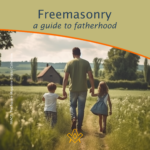 Freemasonry: A Guide to Fatherhood In the sacred halls of Freemasonry, fathers discover a hidden power to transform their parenting journey. With its timeless values, supportive community, and life-enriching teachings, Freemasonry empowers fathers to provide a moral compass, foster self-improvement, build stronger connections, and embrace the confidence and wisdom needed to navigate the complex realm of fatherhood. |
 Courage as a core value in Freemasonry Freemasonry, a revered fraternity, prioritizes virtues like honesty and charity. However, courage is foundational. From Plato to Maya Angelou, courage is vital for other virtues. Freemasonry's teachings, referencing events like Gettysburg, emphasize diverse courage forms. In today's divided world, Masons promote and exemplify courage, understanding its importance in facing challenges. |
 How Freemasonry Cultivates Ideal Entrepreneurial Traits Freemasonry's cryptic rituals hold timeless lessons for building entrepreneurial greatness. Through tests of passion, vision and skill, Masonic teachings forge ideal traits like grit, creativity and alliance-making needed to seize opportunity and elevate enterprises. The right commitment unlocks code for entrepreneurial success. |
 What you see praiseworthy in others "What you see praiseworthy in others, carefully imitate, and what in them may appear defective, you will in yourself amend". This passage of Masonic ritual (Taylors Working, Address to the w |
 How to Learn Ritual with a Learning Disorder So what do you do when faced with that little blue book? Most Masons when first looking at the ritual book can understandably be fazed – the tiny print, the missing words, the questions and answers! Learning ritual can be a challenging task for anyone, especially individuals with learning disorders, but it is not impossible. Here are some tips to help make the process easier. |
 A "mind palace", also known as a "memory palace", is a technique for memorizing and recalling information. How would your life change if you could remember anything and everything? Discover the 'Mind Palace' and all will be revealed. |
 What is leadership and who does freemasonry help develop those skills needed to be a better leader |
 A story of the 'Ruffians' – those individuals whose paths cross ours, who feel entitled to seize and consume the property of others that they have not earned. A lesson to build character to be a better citizen of the world. |
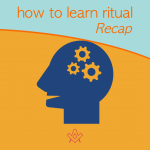 Now we are back in the Lodge room once again, maybe it is time to review how we learn and deliver ritual and look at different ways of improving that process. |
 Making an advancement in Masonic Knowledge can become far easier when you 'learn how to learn'. |
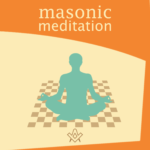 Learn how to practise Masonic meditation in a busy world with all its care and employments |
 Struggling to learn your ritual? Become a 5-Minute Ritualist with the aid of a book of the same name. |
 Day in the life of a Freemason As we start a new year, maybe start it with a new habit? |
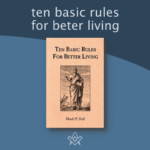 Ten Basic Rules For Better Living Ten Basic Rules For Better Living by Manly P Hall |
 How can we use masonic leadership skills to avoid confrontational situations? |
 How the Trivium is applied to Critical Thinking - {who, what, where, when} - {how} - {why} |
 The Seven Liberal Arts - why 'seven', why 'liberal', why 'arts'? |
 How to improve your public speaking skill with 6 techniques |
 Do you need to speak in public, or present Masonic ritual without notes ? |
 What are logical Fallacies and how to spot them |
 Share one easy tip to learn masonic ritual; Some good tips from Facebook followers |
 How can we use the 7 secrets of the greatest speakers in history |
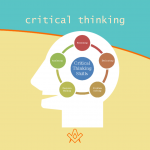 What is a critical thinker and what are their characteristics? |
 Share one personal skill Freemasonry helped you to improve? How can we make practical use of the lessons taught in Masonic writings? |
 An introduction to the art of public speaking - speak with confidence |
 Seven Liberal Arts and Sciences What do you know about Seven Liberal Arts and Sciences |
 Three Words That Will Change Your Life This article discuss a common situation found in many lodges - a difficulty in holding a conversation with a stranger. |
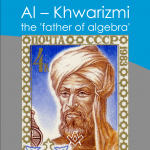 Al - Khwarizmi live c750 - c820 is credited as being the father of Algebra, being asked what is Man, give his answer in an algebraic expression |
masonic knowledge
to be a better citizen of the world
share the square with two brothers

click image to open email app on mobile device


